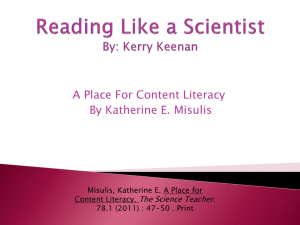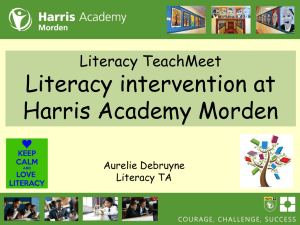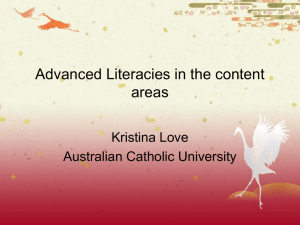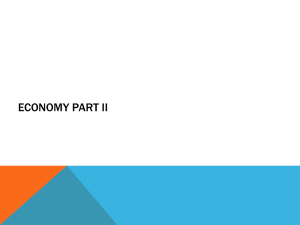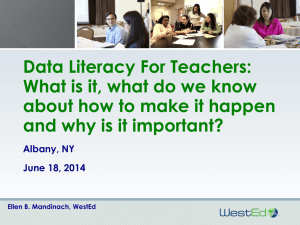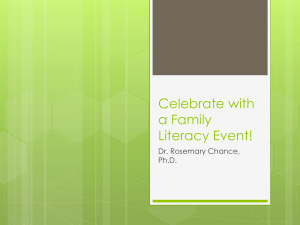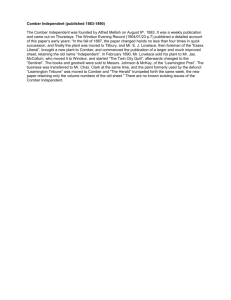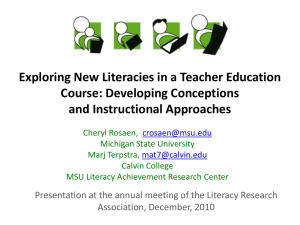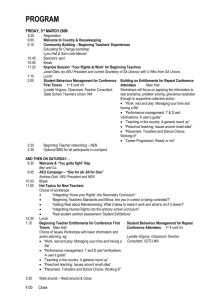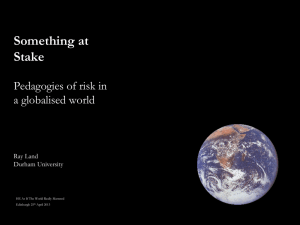Follow this link - Australian Education Union (SA Branch)
advertisement
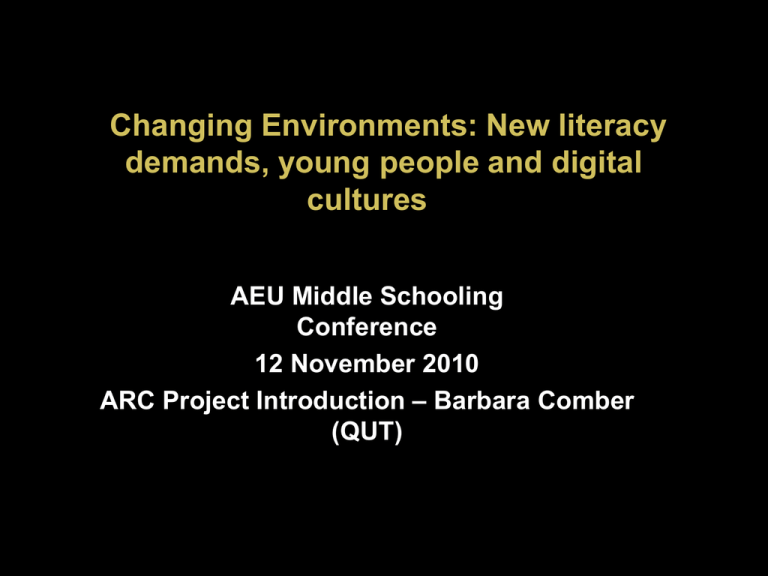
Changing Environments: New literacy demands, young people and digital cultures AEU Middle Schooling Conference 12 November 2010 ARC Project Introduction – Barbara Comber (QUT) New literacy demands in the middle years: Learning from design experiments Australian Research Council Linkage Grant •AEU •DECS •UniSA •University of Sydney •University of East Anglia •Queensland University of Technology • Collaborators • Lynn Hall - AEU • Chris Thompson & Deb Merrett, Tanya Scobie, Theresa Andreucci, Jane Foster, Helen Grant, Ruth Trimboli & Marg Wells (DECS) • Helen Nixon & Anne-Marie Morgan (UniSA) • Peter Freebody (University of Sydney) • Victoria Carrington (University of East Anglia) • Barbara Comber (Queensland University of Technology) Summary • This project aims to document and improve student literacy across the curriculum in the middle years, via a suite of collaboratively crafted design experiments. It will investigate the relationship between innovative pedagogical practices and the wellbeing of classroom teachers. In this study, two areas of educational research that are often considered separately–-curriculum and pedagogy and teachers’ work–-are deliberately explored together. Combining analysis of state-wide data sets and micro investigations of classroom practice, this research will develop new understandings about sustaining improvements in pedagogical practice, concomitant improvements in student literacy outcomes, and the professional identities and welfare of teachers. Project design • • Phase 1: Data analysis to identify sites for intervention This phase will include: – analyses of a large corpus of student data: various middle years data sets that cross-reference student literacy achievement, learning area outcomes, cohort measures, absenteeism and inschool disengagement, and behaviour management; – analyses of a large corpus of teacher data: teacher well-being, including for example reports of stress, safety and absences, as well as teacher knowledge of literacy, and dispositions and pedagogical strategies for approaching middle years education • Phase 2: Targeted interventions using Design Based Experiments – Year 5 in 2010, & Year 9 in 2011 – Documentation of collaboratively constructed field experiments of varying scale to enhance teacher manageability and students’ learning of curriculum literacies • Phase 3: Meta-analysis of Design-based Experiments in the context of DECS trend and cohort data • Pilot study 2009 – Investigating literacy Years 4-9 Three design experiments were developed and implemented in collaboration with teachers: • (i) Science/English curriculum specific digital literacies (CI Freebody - & Tanya Scobie, Theresa Andreucci, Jane Foster – Glen Osmond Primary) • (ii) Digital cultures and youth (CI Nixon & Helen GrantGilles St Primary) • (iii) Place-based pedagogies (CI Comber & Marg Wells & Ruth Trimboli, Ridley Grove R-7) • (i) Science/English curriculum specific digital literacies (CI Freebody) - working collaboratively with teachers to intensify the focus on the distinctive leaning demands and opportunities arising in these two curriculum areas. • (ii) Digital cultures and youth (CI Carrington) • working collaboratively with teachers and students to (i) research and analyse the ways in which students are using digital texts and technologies outside the classroom to participate in a range of public and private social spheres and (ii) work towards developing and trialling classroom pedagogies and literacy practices that build repertoires of basic skills and critical analytic frames that work to value-add students’ in and out-of-school engagements with a range of texts. • (iii) Place-based pedagogies (CI Comber) • working collaboratively with teachers and students to (i) to identify specific eco-social problems they wish to address across the curriculum and (ii) negotiate and design place-based literacy pedagogies that capitalise on the affordances of the local environment. Project-specific presentations & workshops • Challenges in the middle years: curriculum literacy, expertise and ‘good-enough’ knowledge – Peter Freebody • Science literacies – Tanya Scobie, Theresa Andreucci, Jane Foster • “It’s not an accident to make a film…”: digital literacies and youth cultures, Helen Grant • Place and community-based pedagogies – Marg Wells & Ruth Trimboli • Early adolescents and digital cultures – Victoria Carrington DECS & AEU Policy and Practice presentations • David Smith’s welcome to country • Lyn Hall, Outline, context & AEU Curriculum organiser online, closing • Chris Thompson, Literacy demands: A text focus • Deb Merrett, TfEL Framework: An introduction • Ambra Scarlett & Carol Allen, Creating professional e-portfolios.


